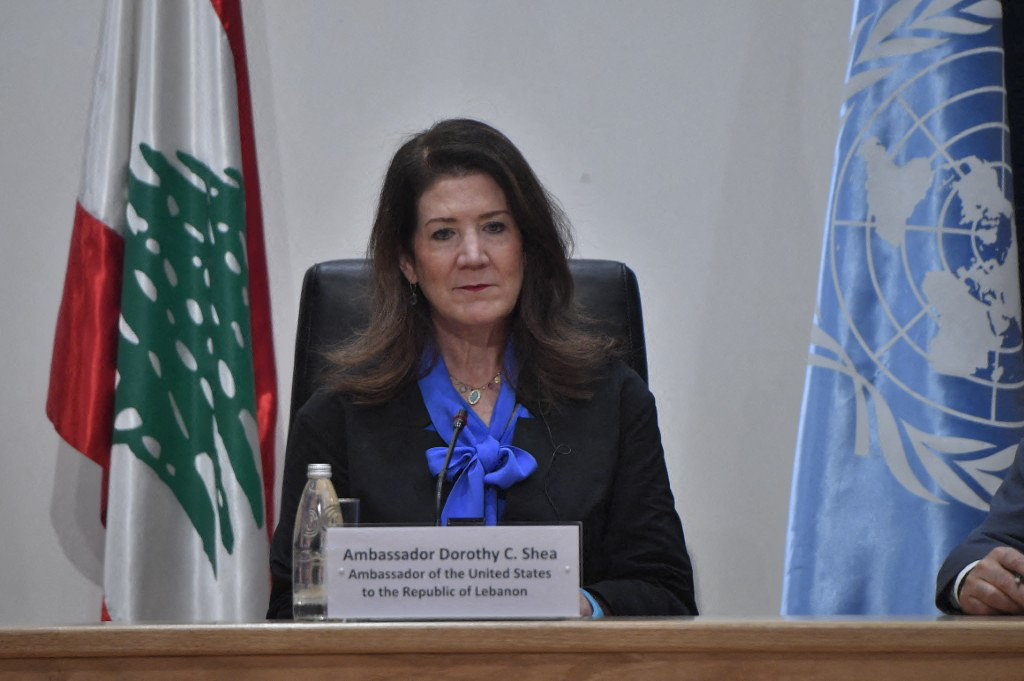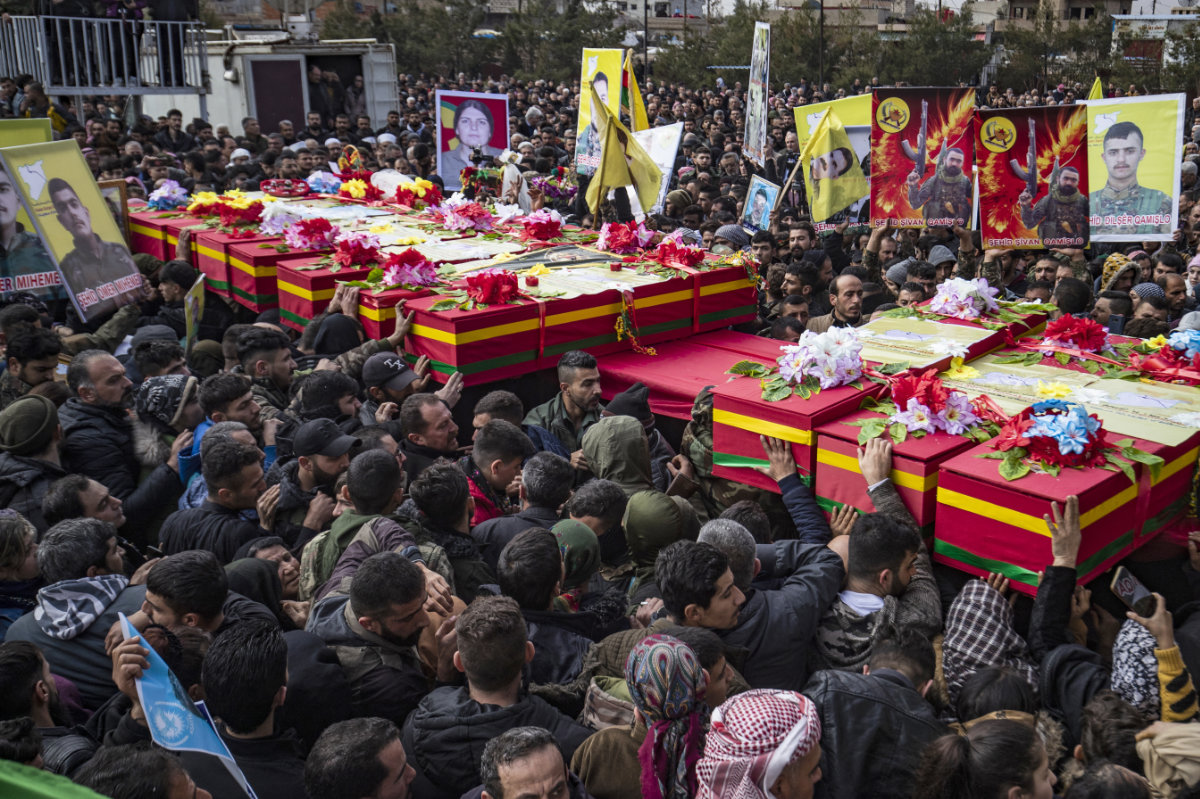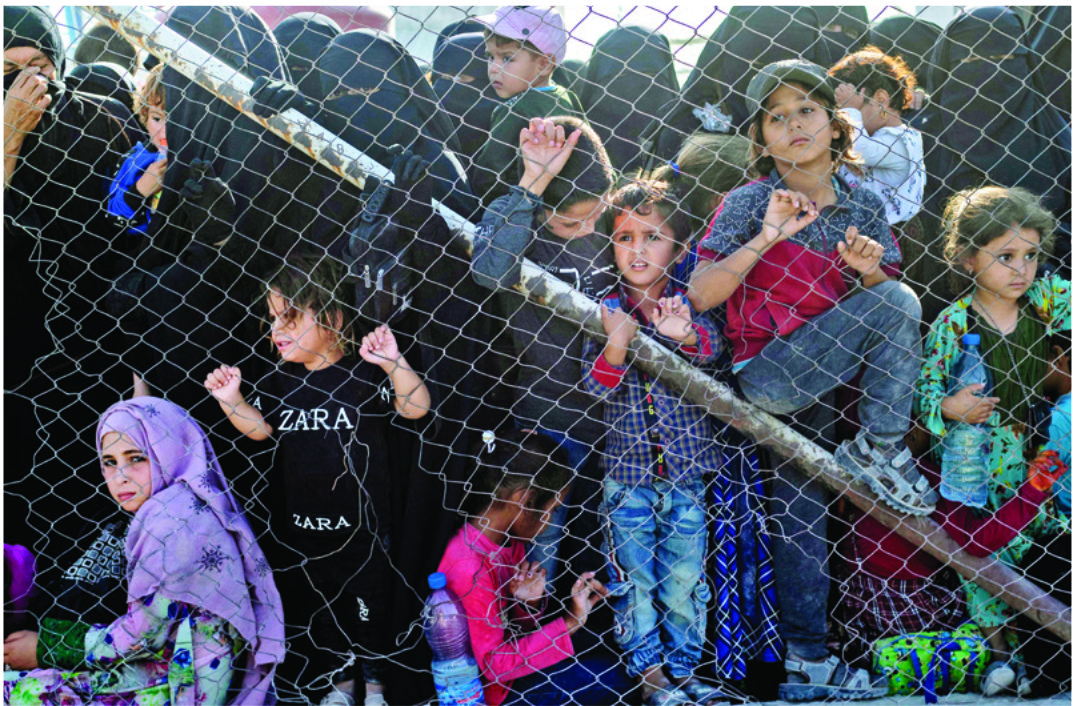LONDON: Camps and prisons housing Daesh-linked detainees in the northeast of the Syrian Arab Republic have become a ticking time bomb, amid the power vacuum created by the collapse of the Assad regime and cuts to aid from the US.
The Kurdish-led Syrian Democratic Forces, which helped the US defeat Daesh in 2019, has since then been overseeing Ghuwayran prison, Al-Hol camp and Al-Roj camp, which hold about 56,000 Daesh fighters, their wives and their children.

Members of the Syrian Democratic Forces (SDF) deploy around Ghwayran prison in Syria's northeastern city of Hasakeh on January 25, 2022, which was taken over by Daesh fighters days earlier. (AFP)
US assistance has been critical in efforts to secure the camps, which are widely considered to be breeding grounds for extremism and a regional security concern. But last month, Washington told the UN Security Council its support “cannot last forever.”
Dorothy Shea, the acting US ambassador to the UN, said: “The US has shouldered too much of this burden for too long. Ultimately, the camps cannot remain a direct US financial responsibility.”
Without a replacement for American aid, the resources of the SDF-affiliated Autonomous Administration of North and East Syria risk being stretched thin, leaving the camps and prisons vulnerable to revolt or mass escape attempts.
“If US financial assistance is cut without a replacement, it will create significant challenges,” Polat Can, a researcher in international relations and Middle Eastern security, told Arab News.

Ambassador Dorothy Shea. (AFP)
Even with US support, the camps and prisons had been starved of sufficient funding and manpower.
“External financial support has never fully covered the costs of maintaining prison security, managing detainees and sustaining camp residents,” said Can.
Other foreign donors have helped support the maintenance of camps and prisons but the US remains the largest contributor.

In 2021, the UK provided $20 million to expand a prison in Hasakah, according to the Iraq-based Rudaw news network. Meanwhile, the US spent the much larger sum of $155 million in 2022 alone to train, equip and pay the personnel guarding detainees.
The Syrian National Army offensive that began on Dec. 8 — which has displaced tens of thousands of civilians, many of them ethnic Kurds, from the Shebha region — has placed further strain on the SDF.
The Syrian National Army is backed by Turkiye, apparently as a bulwark against the perceived threat posed by Kurdish militants linked to the Kurdistan Workers’ Party, or PKK, which recently declared a ceasefire in its decades-old conflict with Ankara.
Washington-based Kurdish affairs analyst Mutlu Civiroglu told Arab News that the SDF has redeployed about half of its personnel that was guarding the prisons to “defend the region from Turkish attacks.”

Attacks by Turkish troops in Syria's northeastern Hasakeh province in the past few years had forced the Kurdish-led SDF to redeploy about half of its personnel that was guarding the prisons. (AFP file)
These developments have made it increasingly difficult for the SDF to contain the threat of a potential Daesh resurgence. As recently as November, a Daesh operative reportedly infiltrated Al-Hol camp and helped fighters to escape.
“The region’s resources are limited, and without external funding the ability to maintain security at these facilities will be increasingly strained,” Can said.
“In the worst-case scenario, this could lead to security vulnerabilities that Daesh cells may attempt to exploit, particularly as the group remains active in the Syrian desert and continues efforts to infiltrate” northeastern areas controlled by the autonomous administration.

Daesh inmates in SDF-run prisons in northern Syria are packed in overcrowded cells. (AFP file photo)

Daesh inmates in SDF-run prisons in northern Syria are packed in overcrowded cells. (AFP file photo)
The SDF has warned in recent months that the Daesh threat is greater than ever, citing the presence of active sleeper cells in Al-Hol camp and concerns about detainees escaping from Ghuwayran prison.
These fears have intensified since US President Donald Trump announced plans to withdraw US troops from northeastern Syria. “Syria is its own mess,” he said in late January. “They got enough messes over there. They don’t need us involved in every one.”
The SDF has also warned that Daesh is attempting to infiltrate the eastern Deir ez-Zor province from the western bank of the Euphrates River. The UK-based Syrian Observatory for Human Rights has recorded at least 37 Daesh operations in the province since the start of the year, including armed attacks and bombings targeting security forces in areas controlled by the autonomous administration

Fears have intensified since US President Donald Trump announced plans to withdraw US troops from northeastern Syria. (AFP file photo)
Until Dec. 11, Deir ez-Zor was under SDF control. However, after a coalition led by Hayat Tahrir Al-Sham ousted the Assad regime on Dec. 8, it seized the oil-rich eastern city. The SDF remains a presence in parts of the countryside.
In a historic move on March 10, the SDF’s commander-in-chief, Mazloum Abdi, and Syria’s new president, Ahmad Al-Sharaa, signed a deal to integrate SDF-controlled civilian and military institutions with the new Damascus administration.
The agreement, signed as Al-Sharaa faced international pressure over the killing of Alawites by government-linked militias in western Syria, could ease the pressure on the SDF, particularly by securing a nationwide ceasefire.
However, the accord, which is set to be implemented by the end of this year, is unlikely to bring any immediate changes to the situation in the Daesh camps and prisons, said Can.

Until now, at least 42,000 women and children from 110 countries remain in overcrowded, squalid conditions in Al-Hol and Al-Roj, according to the UN. (AFP file)
“The issue of detainees — both militants in prisons and their families in camps — remains a major financial, logistical and security challenge in northeastern Syria,” he added.
The US aid freeze will not only affect prison management but also many humanitarian and civilian infrastructure projects, which had long eased some of the financial pressure on the autonomous administration.
Civiroglu said the suspension of aid from the US could create “further uncertainty, especially for initiatives related to displaced persons, refugees, rehabilitation and health services.”
He added: “Syria has long been under siege, embargo and civil war, and Rojava — Kurdish Syria — has been affected even worse. On one side, there’s the opposition group; on the other, the Turkish border, which stretches 910 kilometers and has been closed for years.”

People take part in a funeral in Syria's northeastern city of Hasakeh on February, 4, 2022, for Syrian Democratic Forces fighters killed in clashes during a jailbreak attempt by the Daesh group at the Ghwayran prison. (AFP file)
He warned that projects in northeastern Syria established by the US Agency for International Development “have been negatively affected, with many halted.” But Washington’s aid freeze will impact Syria as a whole, he added.
USAID was one of the first targets of the Department of Government Efficiency, which was established by the Trump administration to root out what it views as waste and fraud in the federal bureaucracy.
As a result, the organization and all of its programs essentially have been shut down, creating a massive black hole in the international humanitarian aid budget, with major consequences for fragile states such as Syria.
The Syrian economy is reeling after 14 years of civil war and sanctions. The interim government said the country owes between $20 billion and $23 billion in external debt, a figure that far exceeds its 2023 gross domestic product of $17.5 billion, according to the World Bank.
After the civil war broke out in 2011, Daesh exploited the chaos to expand, attracting tens of thousands of fighters from around the globe. By 2014, the group had conquered an area about the size of Great Britain, spanning Iraq and Syria, where it declared a caliphate.

This aerial picture taken on January 27, 2024 shows a view of al-Hol camp in Syria's northeastern Al-Hasakah Governorate. The al-Hol camp is the largest of two in northeastern Syria holding the families of Daesh fighters. (AFP)
However, US-led coalition efforts, an SDF ground offensive, and Russian airstrikes wore the group down until its eventual territorial defeat in Baghuz, eastern Syria, in March 2019.
After Daesh’s collapse, foreign fighters and their families were detained. Even now, at least 42,000 women and children — about 80 percent of all detainees — from 110 countries remain in overcrowded, squalid conditions in Al-Hol and Al-Roj, according to the UN.
Rights groups have consistently urged countries to repatriate their nationals who are detained in the camps. New York-based Human Rights Watch has said the continuing detention of these foreign nationals is “unlawful,” noting that they are held under “life-threatening conditions.”
Civiroglu said that “despite the US push and the SDF’s appeal to the international community, there has been little progress in that regard.”
Since 2017, Iraq has repatriated more than 17,796 of its nationals from Syria, according to the Rojava Information Center, but Western countries remain reluctant to do the same.
“The responsibility for these detainees extends beyond the region, as it is an international issue that should involve the UN, the UN Security Council, the Global Coalition to Defeat Daesh, the US, and the governments of the detainees’ home countries,” said Can.

Roj, one of two Kurdish-run displacement camps housing foreign family members of suspected Daesh fighters, is smaller and better guarded than its overcrowded counterpart Al-Hol, which has been rocked by assassinations and breakout attempts in recent months. ( AFP)
Harout Ekmanian, an international lawyer at Foley Hoag in New York, also believes that during this critical transitional period in Syria, countries with citizens in the camps have an obligation to repatriate them and ease the pressure on local authorities.
“States with citizens in these camps should take responsibility by facilitating the repatriation of their nationals, providing consular assistance, and ensuring that they are either prosecuted in accordance with fair trial standards or rehabilitated and reintegrated,” he told Arab News.
“With the collapse of the Syrian regime, the restoration of diplomatic channels has become more feasible, leaving no justifiable reason for countries in Europe and beyond to continue delaying the repatriation of their citizens and their families.
“This should not be seen as a favor or charity for Syria, but rather an international obligation for all states with citizens in these camps.”
UN Security Council Resolutions 2178 and 2396 explicitly call on states to prosecute, rehabilitate or reintegrate foreign terrorist fighters, underscoring the responsibility of countries to take action on this matter.
“These prisons house individuals responsible for some of the most egregious international crimes, including the Yazidi Genocide between 2014 and 2017,” said Ekmanian.

Children of Daesh inmates in northern Syria live in overcrowded condition. (AFP file)
“Syria is not adequately equipped to manage the accountability mechanisms and legal procedures required for such a large number of Daesh members. Therefore, states must ensure criminal accountability via their national courts for those responsible for these crimes, as part of their repatriation and reintegration efforts.
“Additionally, it would be ideal for Syria to collaborate with international partners to develop the necessary capabilities and mechanisms to prosecute Daesh members held in these camps. This issue is also closely tied to the broader need for transitional justice in Syria.”
Echoing similar concerns, Can, the Middle East security expert, said that while local authorities in northeastern Syria have engaged with international actors to seek long-term solutions, including efforts to repatriate foreign detainees, “many governments remain reluctant to take responsibility for their citizens.”
He added: “At this stage, there is no fully sufficient alternative plan that could compensate for the loss of international support. So, any major funding gap could deepen existing security risks and create further instability.
“Given the global implications of this issue, sustained international attention and responsibility-sharing are critical.”

































